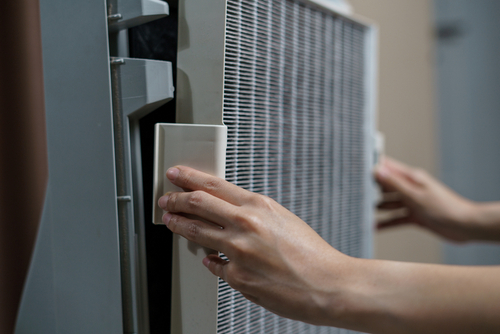Definitely Yes and No – the method is the deciding factor
Last month, we discussed the use of HEPA filter units. Beyond question, HEPA filters are helpful in ridding air of 99.7% of harmful particles in your home or office, including; allergens, pollen, dust/dust mites, mold, pet dander, and even viruses.
Can HEPA filters capture Coronavirus
Yes. HEPA filters can catch particles that contain coronaviruses. People expel droplets of respiratory fluid, saliva, and possibly viruses into the air when breathing, coughing, and talking. Even if the water in the droplet evaporates, the droplets contain salts, proteins, and other material in addition to any virus, which means the remaining particles are typically a few microns in size, making them fairly easy to trap with a HEPA filter (.3 micron capability), according to Faye McNeill a Columbia University Chemical Engineer.
Having to replace the filters is the one negative of HEPA air purifiers
HEPA air filtration units are reasonable to purchase, around $115 for most popular models. But high-quality HEPA replacement filters cost an average of $39. If you have 3 units in your home or office you are paying, with sales tax, over $120 every three months. In some special units, HEPA replacement filters cost $300 or more.
Maintaining HEPA filters are a hassle
For busy human beings, remembering to replace HEPA filters every three months is an onerous task — even with the flashing red replacement lights on our units. Furthermore, the big box retailer, which gladly sells your new HEPA unit, suddenly disappears when it comes to stocking the very filter that makes your air purifier effective. So, good hunting.
Some HEPA units have washable filters
You can dig into your user’s manual, but if your filter is permanent and washable, you were probably made aware of this valuable sales feature when you bought the device. In most cases, you will find that the manufacturers recommend purchasing their replacement filters with no mention of cleaning.
So, to clean or not to clean…
Peter Simmons of Dustfreerooms.com, after having reviewed research in this area, finds the following:
- Washing with soap, brush and water – A disastrous choice from the outset due to irreparable damage to the filter.
- Running cold water through the filter – “Extremely discouraging results” – especially considering that some manufacturers approve of cold water washing – Water washing caused a staggering 31% decline in performance.
- Applying an air compressor – Results are just short of water washing.
- Vacuuming – Often slightly improves the filter’s performance. But cleaning must be gentle – do not force the vacuum nozzle against the fibers.
How to clean your HEPA filter using a vacuum
- Take the unit outdoors before removing the filter. Doing this outside prevents allergens from re-contaminating your home or office. On most units, filter removal is an easy do-it-yourself task.
- Hold the filter and tap it gently to remove visible debris into a trash can. Then vacuum gently over the filter surface being careful not to pull the filter fibers out. Remember to vacuum the machine itself.
- Reinsert the filter and place the unit in a central position in the room – not up against a wall or furniture.
How often should you clean
Once every three months on average. Clean more frequently for rooms with higher pollution. The unit’s replace filter indicators light up after a certain set amount of days that may not be appropriate for your room. Be sure to visually check your filter before cleaning because over-cleaning will shorten the life of your filter.
In an office setting or manufacturing area, your LACOSTA crew is more than willing to accommodate your use of HEPA filter systems and units. Talk with your LACOSTA manager about regular filter replacement or periodic cleaning to extend the life of your units and filters.


